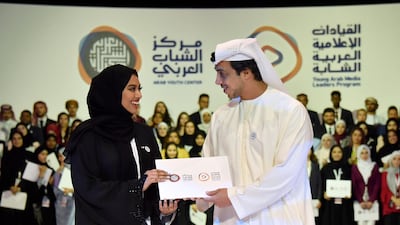Arab students and young professionals have completed a learning programme in Abu Dhabi, as Sheikh Mansour described them as "the future generation" of leaders in the media.
The 100 participants - from 18 countries in the Arab world - graduated from the two-week Young Arab Media Leaders programme at a ceremony on Saadiyat Island.
During the programme they took part in talks and training sessions with journalists from a range of outlets in Dubai and Abu Dhabi, including Reuters and The National.
Among them were students, trainee journalists and social media executives.
"Today, we are celebrating a future generation of leaders, influencers and pioneers in the media sector, and we are counting on them to employ their new knowledge and expertise in spreading positivity," said Sheikh Mansour, Deputy Prime Minister, Minister of Presidential Affairs and Chairman of the Arab Youth Centre.
He said such young people were crucial in "confronting negative ideas, developing their communities, conveying a bright civilised image of their realities, and motivating their peers to actively participate in creating a prosperous future for their communities".
And he said "we have invested in developing their knowledge and preparing and qualifying them to become future leaders".
The 13-day programme focused on the rise of fake news and bias in reporting.
It also touched on positively influencing social media and the impact of artificial intelligence on the media.
Journalists from The National hosted sessions on breaking news, trust in the media, publishing simultaneously on multiple platforms and how to measure and analyse social media reach.
The closing ceremony was attended by Noura Al Kaabi, Minister of Culture and Knowledge Development; Shamma Al Mazrui, Minister of State for Youth Affairs and Vice Chair of the Arab Youth Centre and Mona Al Marri, director-general of Dubai Government Media Office.



